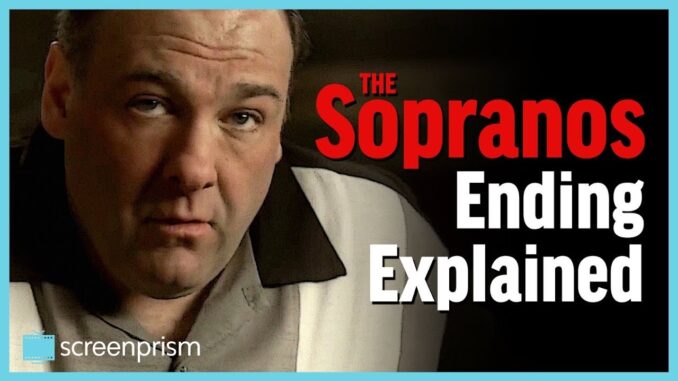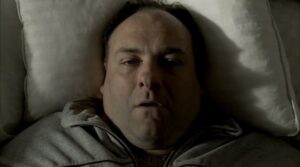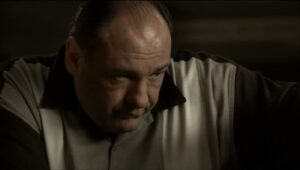
Ending Explained is a recurring series in which we explore the finales, secrets, and themes of interesting movies and shows, both new and old. In this entry, we dig into the Sopranos ending and try to make sense of that shocking cut to black.
In 1999, David Chase changed television forever when he introduced us to Tony Soprano (played by the late, great James Gandolfini) and his charming brand of sociopathy. Paving the way for small screen antiheroes for years to come, fans were excitedly conflicted about supporting a protagonist who kills with a smile on his face.
Still garnering conversation from fans who watched the pilot more than twenty years ago as well as the swaths of new fans The Sopranos still attracts, the conclusion of the series, with the June 2007 episode “Made in America,” quickly became one of the most iconic finales in television history.
So. What happened that night in Holsten’s? What does that cut to black mean? Is Tony dead? Is he alive? Was the Man in the Members Only Jacket sent by one of the many, many people Tony has pissed off over the years to finally whack him once and for all?? Do the lyrics to Journey’s “Don’t Stop Believin’” offer any hints?
First, let’s recap: “Made in America” opens with a God’s eye view shot of Tony, evoking an ominous visual of him laying in a coffin. Bobby Bacala is dead. Silvio is in a coma, presumed to never regain consciousness. And Phil is nowhere to be found.
But still, Tony jolts awake, living to see yet another day.

Since the tension with New York boiled over to a full-blown war, both Tony’s family and Family have been on the lam. But in classic Sopranos form, the war with New York ends not with a bang but with a perfectly anti-climactic whimper. After all the fear and hiding, Tony gets the go-ahead from Butch to deal with Phil however he sees fit.
After his comically gruesome demise, Phil is no longer a threat and Tony gets a temporary moment of reprieve. That is until his lawyer informs him Carlo’s talking to the feds and there’s an eighty-to-ninety-percent chance Tony will get indicted within the next few days.
As we approach the final fifteen minutes of the finale, there is a heavy sense of closure for Tony; his consigliere is in a coma, his brother-in-law is dead, and he’s staring down the barrel of the trial of a lifetime. So what does Tony do? Well, he meets his family at an ice cream parlor for dinner and orders a basket of onion rings.
The final sequence of The Sopranos at Holsten’s begins innocently enough. Tony walks in and looks around for his family. He’s the first to arrive. After Tony is seated, the tension starts to build as we see a quick succession of shots of the rest of the restaurant. Tony flips through the jukebox on his table, looking up each time the door dings and someone walks in.
Just as Steve Perry begins crooning, Carmela walks through the door. “Just a small-town girl.” A cut back to Tony, “Just a city boy.” The editing continues at an unnaturally fast pace, flipping between close-ups of Carm and Tony as they catch up and wait for AJ to arrive. The door dings again. AJ walks in, a few steps behind a man who sits at the bar.
The man at the bar quickly glances back toward the Sopranos’ table. An abrupt cut to AJ and then we’re outside the restaurant. Meadow is struggling to parallel park. There’s a flurry of shots from different angles as she hits the curb and keeps trying. The music and tension continue to rise.
Inside, the man at the bar looks back again. Carmela, AJ, and Tony continue chatting. AJ complains about the banality of his new job. Carmela reassures him it’s worthwhile work. Tony tells him to buck up. Suddenly we’re outside again and Meadow is still trying to park. Back inside. The man at the bar stands. Tony looks up. Cut to AJ. The man walks by the Sopranos and into the bathroom.
There’s a brief shot of other patrons and then back to Meadow. The shots are cut together at a dizzying speed and the tension is almost too much now. Jump inside to a wide shot of the family. One by one, shots of Carmela, then AJ, and finally Tony each placing whole onion rings in their mouths as if they’re taking communion. Meadow runs across the street, narrowly avoiding being hit by a car.
One more cut to the table as the door dings one last time. Tony looks up and

That now-infamous cut to black inadvertently catalyzed over a decade of heated debate. Many fans thought for certain it meant Tony was dead. Others argued that he had to be alive: after all, we’ve been with Tony for eight and a half years at this point, and if he’s going to die, we had better get to see it. A lot of us sat in front of silent screens, wondering why their cable cut out at the worst possible moment.
“You probably don’t even hear it when it happens, right?” Bobby says to Tony in the Season 6 episode “Sopranos Home Movies,” which aired two months prior to the finale. This quote is echoed at the end of “The Blue Comet,” the series’ penultimate episode that sees Bobby’s own extremely violent death. Is the cut to black Tony not hearing it when it happens?
For those who believe that the cut to black signifies Tony’s death, the most common theory is that the man at the bar (credited only as Man in the Members Only Jacket) went to the bathroom, grabbed a gun behind the toilet — a la Michael Corleone in The Godfather — and whacked Tony from behind.
Perhaps a more optimistic bunch, fans who see no reason to believe Tony is dead point towards the empirical evidence of the Holsten’s sequence. This is an ice cream parlor. There aren’t any secret assassins or crazed gunmen, just a young couple on a date and a Boy Scout troop. In their eyes, the cut to black is simply the end.
Maybe Tony Soprano lived out the rest of his days until he died old and riddled with dementia, like Uncle Junior. Maybe Carlo the rat revealed too much to the FBI and Tony was indicted, this time finally the big one. Maybe the Man in the Members Only Jacket was sent by Eugene Pontecorvo’s widow. Her husband killed himself when Tony refused to let him leave the Family in the aptly named Season 6 opener, “Members Only.”
No matter what really happened, this is the end of the line for us.
Bobby’s musings on what happens when you get killed, while often offered up as definitive evidence of Tony’s unfortunate fate, can just as easily be applied to us. Whatever happens, as the door opens, we didn’t hear it happen. We’re plucked from Tony Soprano’s world just as quickly as we would’ve been if we’d shared the same fate as the long line of those whacked before us.
“There’s two endings for a guy like me… Dead or in the can,” Tony once told Dr. Melfi. Considering those two possibilities, David Chase’s subversive ending is something of a Rorschach test: did you see Tony die or live long enough to make it to the can?
What we believe happens here says much more about each viewer than it does about Tony. Even after seeing all the pain and suffering that men like Tony put out into the world, are we heartbroken that this life we’ve shadowed for so many years is gone? Like Tony after Livia’s passing, are we guilty about not being sad enough?
Did we want to see Tony live?
Or are we just disappointed we didn’t get to witness his blood spill for ourselves?
